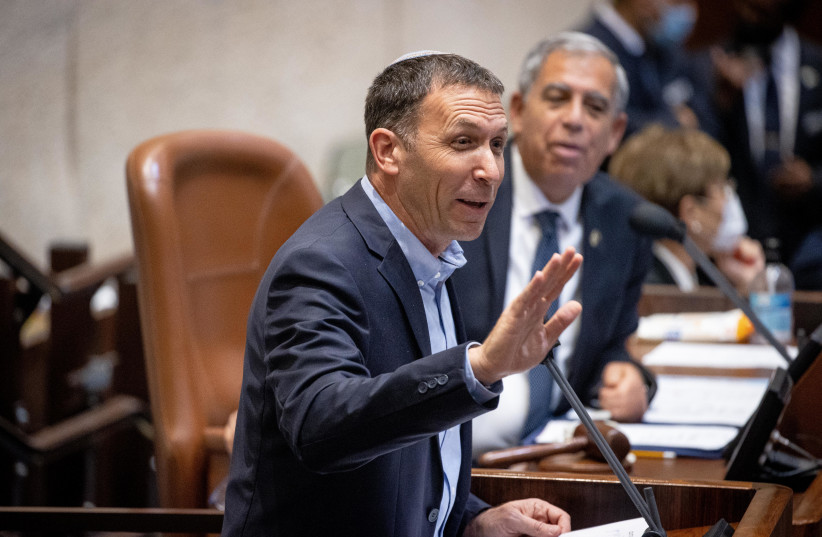Religious Affairs Minister Matan Kahana sparked a storm among haredi (ultra-Orthodox) and National-Religious rabbis after he recommended earlier this week that Rabbi Benayahu Brunner – a member of the Tzohar organization and a judge in the batei dinim (rabbinical courts) for conversion and monetary disputes in Safed and Haifa – should lead the Conversion Authority.
The appointment comes after Kahana decided to end Rabbi Moshe Weller’s role as the current head of the authority because he operates according to Ashkenazi Chief Rabbi David Lau’s instructions. Lau expressed outrage at the decision last week, saying it would “severely damage” the function of the authority, warning that he would immediately stop approving conversion certificates if Weller was removed.
On Wednesday, Finance Minister Avigdor Liberman filed a complaint with the ombudsman of the judiciary against Lau, writing that the rabbi’s placing of a condition on signing conversion certificates is “a hinted threat, not to mention extortion through threats.” Liberman stressed that Lau is a public servant and is required by the law to fulfill his role as long as he is serving in it.
The finance minister added that if the chief rabbi carries out his threat, it should be considered “improper behavior” and that the continuation of Lau’s service as the president of the Great Rabbinical Court would need to be reconsidered.
Tzohar welcomed the appointment of Brunner, saying, “His pleasant temperament and extensive knowledge of the field ensure that conversion is in good hands.”

MK Moshe Gafni attacked Kahana for the appointment of Brunner, saying that it was “placing an idol in the heichal” (a reference to the sanctuary of the ancient Temple in Jerusalem).”
Gafni stated that there has always been an agreement between the National-Religious and haredi sectors not to appoint Brunner “in order to prevent a rift” between the two sectors. “The goal of Matan Kahana is to divide the nation and stay only with the doers of his word,” claimed Gafni, saying that history will “condemn” him.
NATIONAL-RELIGIOUS officials expressed outrage at Gafni’s statements, including fellow members of the opposition.
Religious-Zionist MK Ofir Sofer called the statements “wretched” both in terms of values and politics, saying it “only harmed the resilience of the opposition.”
Religious Zionist Party head Betzalel Smotrich stressed that Brunner is “a scholar and an important judge and is very worthy for the position,” adding that he was sad concerning the “circumstances of his appointment and especially about the fact that Kahana intends to relinquish most of his authority as part of the privatization of conversion that he is advancing.”
Smotrich strongly protested the contempt and attacks against Brunner, wishing the rabbi great success in his role.
In response to Gafni, Kahana stated, “We have stopped working for you,” telling the haredi MK, “Look elsewhere for children to smack around.” The religious affairs minister stressed that great National-Religious rabbis, including Rabbi Haim Druckman, had recommended the appointment of Brunner.
Despite media reports earlier this week claiming Kahana’s plan would recognize Reform conversions, the minister stressed that the plan would only allow conversions conducted according to Halacha (Jewish law).
On Tuesday, Rabbi Shmuel Eliyahu, the chief rabbi of Safed, said he had warned Kahana that 99% of National-Religious rabbis oppose the minister’s plan and that he was “tearing apart the nation and making lineage records necessary,” according to the National-Religious news site Srugim.
Eliyahu told Kahana that he could improve the plan and make it more friendly alongside the Chief Rabbinate, warning that the minister was trying to pass the law “in a version that neutralizes the Chief Rabbinate and gives any rabbi the power to set his own rules for conversion.”
Kahana’s planned reform of the conversion system has received support from a series of national-religious rabbis, including the roshei yeshiva (religious school heads) of Yeshivat Har Bracha, Yeshivat Har Etzion, Yeshivat Mahanayim and the hesder pre-military yeshiva in Otniel. However, other National-Religious rabbis, as well as rabbis from the haredi sector, have expressed opposition to the plan.
The reform plan being pushed forward by Kahana aims to make conversion more accessible and would allow the municipal chief rabbis to establish conversion courts and use leniencies in Jewish law to convert citizens who are of Jewish descent but are not Jewish according to Jewish law.
Kahana’s proposals include forming a rabbinical committee after legislation is passed that will determine the parameters under which the conversion courts established by municipal chief rabbis will operate.
His legislation also grants the chief rabbis and the Council of the Chief Rabbinate the power, under certain circumstances, to revoke the appointment of a rabbinical judge on the new conversion courts.
